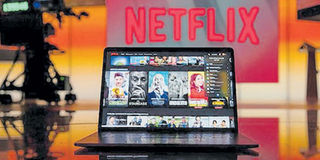Why are big successful businesses blind to changes in their markets?

At present Netflix is worth more than $200 billion and has nearly 200 million subscribers.. PHOTO | FILE
Two entrepreneurs sat nervously. They were at the headquarters of a business one thousand times their size, with an audacious proposal. It had taken them months to convince the big man to even meet them.
The meeting did not take long. The answer was a flat no. Goodbye.
The year was 2000. On one side were the two founders of Netflix — Reed Hastings and Marc Randolph; on the other, John Antioco, CEO of Blockbuster. The latter was then a $6 billion giant that dominated home entertainment with 9,000 stores and 60,000 employees around the world. Netflix was a mere fledgling, mailing DVDs to homes, with just 300,000 subscribers, making losses. But they had big ideas about the future of online streaming.
Just two years after the failed proposal, Netflix was worth $50 million, and kept growing — at Blockbuster’s expense. In 2010 Blockbuster declared bankruptcy. At present Netflix is worth more than $200 billion and has nearly 200 million subscribers.
This story is recounted in an excellent new book by Reed Hastings and Erin Meyer, an INSEAD professor. As Netflix is the company of the epoch, I ordered this book on the day of its release. I may refer to it often in the coming weeks.
Today my concern is different. Why did Blockbuster fail to see entertainment streaming coming? What is it that makes large businesses so blind to far-reaching changes in their markets? As Hastings points out in his book, “…Blockbuster held all the aces. They had the brand, the power, the resources, and the vision. They had us beat hands down”.
I might disagree on the vision, but Blockbuster certainly had everything else. They should have taken this market themselves, yet they stayed stuck in position, thinking people would still come to rent DVDs in stores for a long time to come.
Why did this happen?
Reed Hastings tells us: “It was not obvious at the time, even to me, but we had one thing that Blockbuster did not: a culture that valued people over process, emphasised innovation over efficiency, and had very few controls. Our culture … has allowed us to continually grow and change as the world, and our members’ needs, have likewise morphed around us.”
And that right there is profound. As I have been saying to multiple clients of late: “It’s the culture, stupid.” Most organisations fixate so much on strategy, technology and operations that they forget what is perhaps the most important variable for success in a world of flux: organisational culture.
Think again about what Netflix’s founder is saying there. They adapted, they moved quickly, they took chances. They did things others would not, or could not — because they had a culture that allowed it to happen. It would never have happened at Blockbuster, no matter how many CEOs came and went, unless one of them figured out the essential challenge —our old culture won’t hack it. Our people won’t behave in the ways necessary to compete in a new world, unless the culture drives it.
So what is this amorphous, intangible thing we call culture? And how do we change it? Please note, Netflix had the great advantage of creating its culture as it grew, from scratch. Most large, established organisations don’t have that opportunity — they often try to dismantle their old cultures — often a painful, wrenching process. Most just can’t do it.
Why can’t we all just read the Netflix book, make notes, and adapt their culture for our own organisations? Nope. Won’t work. Cultures can’t be aped or copied and pasted. The transplant will fail. Nor can you just name certain desirable attributes and tell your organisation to adopt them. Cultures emerge from a certain context; they are developed slowly; they are fit for purpose. They evolve.
Netflix, for example, allows its people to decide how much leave they want to take every year; lets people spend company money without excessive control; permits big decisions to be taken without the authorisation of superiors. Any chance your organisation will be letting that happen anytime soon? Nope. I didn’t think so. Works for Netflix, though, because it’s part of a bigger cultural jigsaw.
What should a thoughtful leader do, then? Figure it out from scratch. Which current behaviours are stifling innovation and creativity in the company? What norms prevent us from being agile and responsive? Where did this culture come from? What would great behaviour look like for us to be fit to compete in a fast-changing world? How can I accelerate this change — intelligently?
Culture does not just drive success, it is itself changed by success. Netflix adopted and refined the stuff that worked, it didn’t think it all out in advance. Therein lies the answer.
________________________________________
Sunny Bindra is a management consult-ant, writer and teacher based in Nairobi. www.sunwords.com




